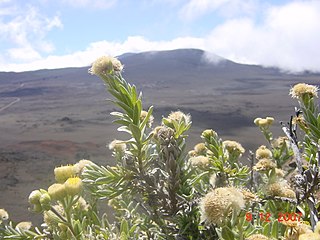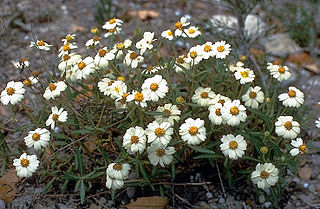
Conyza is a genus of flowering plants in the family Asteraceae.

Inula is a genus of about 80 species of flowering plants in the family Asteraceae, native to Europe, Asia and Africa.
Spilanthes is a genus of African and South American plants in the tribe Heliantheae within the family Asteraceae.

The Heliantheae are the third-largest tribe in the sunflower family (Asteraceae). With some 190 genera and nearly 2500 recognized species, only the tribes Senecioneae and Astereae are larger. The name is derived from the genus Helianthus, which is Greek for sun flower. Most genera and species are found in North America and South America. A few genera are pantropical.

The Gnaphalieae, commonly known as paper daisies, are a tribe of flowering plants in the family Asteraceae. It is most closely related to the tribes Anthemideae, Astereae, and Calenduleae.

Gnaphalium is a genus of flowering plants in the family Asteraceae, commonly called cudweeds or (formerly) chafeweeds. They are widespread and common in temperate regions, although some are found on tropical mountains or in the subtropical regions of the world.

Emilia is a genus of herbaceous plants in the family sunflower family, known as tasselflower or pualele.

Gynura is a genus of flowering plants in the daisy family Asteraceae native to Asia. The best known species is Gynura aurantiaca, often grown as a house plant. This plant is commonly known as purple passion because of the velvety purple leaves.

Cotula is a genus of flowering plant in the sunflower family. It includes plants known generally as water buttons or buttonweeds.

Pluchea is a genus of flowering plants in the tribe Inuleae within the family Asteraceae. Members of this genus might be known as camphorweeds, plucheas, or less uniquely fleabanes. Some, such as P. carolinensis and P. odorata, are called sourbushes. There are plants of many forms, from annual and perennial herbs to shrubs and trees, and there is variation in the morphology of leaves, flowers, and fruits.

Psiadia, commonly known as daisy trees, is a genus of mostly woody Asian and African plants in the tribe Astereae within the family Asteraceae. The genus is distributed throughout the Western Indian Ocean, with species reported from continental Eastern Africa, Madagascar, Mauritius, La Reunion, Rodrigues, the Comoro islands, as well as several of the smaller, uninhabited islands in the Mozambique Channel. Additional species are suspected on Socotra and Sri Lanka, but these have not been confirmed. Phylogenetic studies using DNA sequence data and biogeographic reconstruction using molecular dating have shown that the genus originated on the African mainland, and colonized Madagascar and the outlying islands in the Indian Ocean in several independent instances of overwater dispersal in the Miocene.

Pectis is a genus of flowering plants in the family Asteraceae described as a genus by Linnaeus in 1759.

Anthemideae is a tribe of flowering plants in the subfamily Asteroideae, which is part of the family Asteraceae. They are distributed worldwide, with concentrations in central Asia, the Mediterranean Basin, and southern Africa. Most species of plant known as chamomile belong to genera of this tribe.

Millerieae is a tribe of flowering plants belonging to the Asteroideae subfamily. Of all the genera, only Galinsoga, Guizotia, and Sigesbeckia have species native to the Old World.
Gutenbergia is a genus of African flowering plants in the family Asteraceae.

Baccharoides is a genus of Asian and African plants in the tribe Vernonieae within the family Asteraceae.














